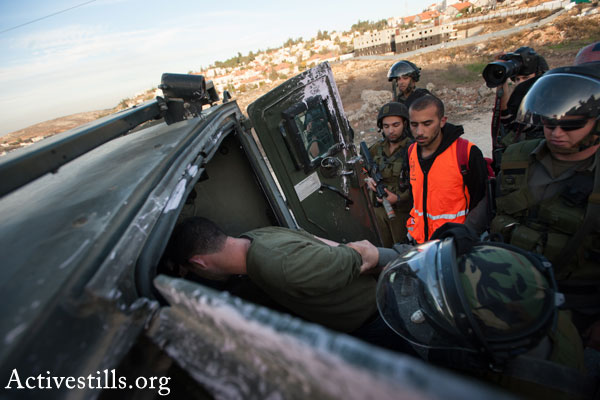As of the end of January 2016, Israel held 568 Palestinians in administrative detention, among them two minors, two women, and one clown.
By Yael Marom

Over 6,000 Palestinian “security prisoners” were being held in Israeli prisons as of the beginning of February, according to statistics published by the Israel Prison Services (IPS). This is the highest number of Palestinian prisoners since July 2010.
Among the prisoners are 398 minors — two of which are in administrative detention, 108 are between 14 and 16 years old, and two are under 14. Out of the 46 women held in Israeli prisons, eight are minors — the highest number of imprisoned female minors since August 2008 — and four are between 14-16. Two of the women are being held in administrative detention.
As of the end of January 2016, Israel held 568 Palestinians in administrative detention, among them two minors, two women, and one clown. These are people who have no idea why they are being held and who have no access to the evidence against them. They were jailed after representatives of the security establishment succeeded in convincing the judge to trust them and their hidden evidence is enough to jail someone without trial. This doesn’t take much when it comes to Palestinians.
A wave of arrests
Israeli human rights group B’Tselem recently published IPS statistics for 2015. The noticeable trend toward the end of the year, since the beginning of the latest round of violence, is clear. In the final three month of 2015, the rise of violence grew in tandem with the rise of Palestinian prisoners. From the end of September until the end of December, the number of Palestinians in prison grew by 15.6 percent to 822. In that same period the number of administrative detainees grew by 85.4 percent to 69.
2015 ended with 6,066 “security prisoners,” among them 422 minors, 44 women, 584 administrative detainees (including six minors, three women, and an number of journalists). These statistics do not include the hundreds of Palestinians held for crossing illegally into Israel from the occupied territories. According to statistics, at any given moment in 2015, over 40 percent of prisoners held in IPS jails were Palestinian. By the end of December, that number climbed to 44 percent.
The Israeli habit of holding large numbers of Palestinians in administrative detention, which is meant to be used in rare or exceptional cases — such as in “ticking bomb” scenarios — has only become even more common this past year.
2015 was also the year in which minors were, for the first time since 2011, put in administrative detention. In October 2015, four Palestinian minors were being held indefinitely without trial; that number grew to six by the end of the year. All the minors who were held in administrative detention were between 16 and 18; their arrest warrants were all for periods of up to three months (although that period can be extended indefinitely indefinitely). The number of minors held in administrative detention at the end of 2015 was the highest since February 2009.

Over 420 Palestinian minors were being held Israeli prisons by the end of 2015 — the highest number since 2008. Of them, four were under 14 years old, and another 116 between 14-16. The number of women in jail nearly doubled between the end of September — when 23 women were being held in IPS facilities — and the end of the year, when 44 women were held (the highest such number since the end of September 2009).
Since the occupation began in 1967, Israel’s military legal system has imprisoned over 800,000 Palestinians. Nearly every Palestinian is related to someone who has spent time in prison. A system that is supposed to be rooted in justice is, in reality, one of the central mechanisms for maintaining the occupation.
Yael Marom is Just Vision’s public engagement manager in Israel and a co-editor of Local Call, where this article was originally published in Hebrew.

